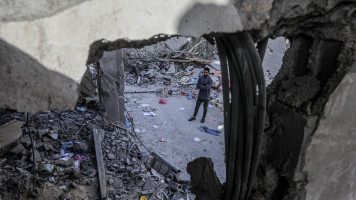Lebanese security forces crackdown on protesters ahead of confidence vote for new cabinet
Lebanese security forces crackdown on protesters ahead of confidence vote for new cabinet
Protesters occupied roads leading to the Lebanese parliament, before being brutally suppressed by the authorities.
3 min read
Security forces in Beirut fired tear gas and water cannons to ruthlessly drive back anti-government protestors on Tuesday, who had gathered to block the passage of senior officials into parliament, ahead of a crucial confidence vote in the new cabinet.
Outside parliament, a group of protestors surrounded the car of Demianos Kattar, a cabinet minister, pelting it with eggs and pounding it with their fists, before a combined army and police force pushed them back.
Angry demonstators had spilled out onto the capital's surrounding squares in their thousands on Monday evening, while Lebanese authorities closed all roads leading to the parliament, The New Arab's Arabic-language sister site reported.
On Tuesday, security forces unleashed tear gas on protesters who were able to remove part of a giant concrete wall. In another entrance, government supporters attacked protesters in order to force them to open the way, leading security forces to separate the two sides.
Outside parliament, a group of protestors surrounded the car of Demianos Kattar, a cabinet minister, pelting it with eggs and pounding it with their fists, before a combined army and police force pushed them back.
Angry demonstators had spilled out onto the capital's surrounding squares in their thousands on Monday evening, while Lebanese authorities closed all roads leading to the parliament, The New Arab's Arabic-language sister site reported.
On Tuesday, security forces unleashed tear gas on protesters who were able to remove part of a giant concrete wall. In another entrance, government supporters attacked protesters in order to force them to open the way, leading security forces to separate the two sides.
The Lebanese Red Cross said 18 injured people were taken to hospitals while 140 others were treated on the spot.
Twitter Post
|
Inside parliament, Prime Minister Hassan Diab began reading the new cabinet's 16-page government statement on a rescue plan, to try to pull Lebanon out of its worst economic crisis since the end of the 1975-90 civil war.
Twitter Post
|
Diab, a little-known academic and former education minister, was tasked with forming a government in December last year, following Saad Hariri's resignation as prime minister.
Months of cross-sectarian demonstrations against the government called for the wholesale removal of a hereditary political elite widely seen as corrupt and incompetent.
While the new Prime Minister vowed to carry the hopes of the protesters, portfolios in his government were shared out along the same partisan and sectarian lines that have defined Lebanon's political landscape for decades.
"We are out on the streets to day because the politicians have stolen from us and plundered our property. I have no confidence in the new government at all," the activist said.
The new cabinet's "emergency rescue plan" includes reforms in the judicial, financial and administrative fields, as well as fighting corruption and fixing the country's finances, according to a copy.
Months of cross-sectarian demonstrations against the government called for the wholesale removal of a hereditary political elite widely seen as corrupt and incompetent.
While the new Prime Minister vowed to carry the hopes of the protesters, portfolios in his government were shared out along the same partisan and sectarian lines that have defined Lebanon's political landscape for decades.
One protester, who spoke to The New Arab, affirmed the prevaling anti-government stance on Tuesday.
"We are out on the streets to day because the politicians have stolen from us and plundered our property. I have no confidence in the new government at all," the activist said.
The new cabinet's "emergency rescue plan" includes reforms in the judicial, financial and administrative fields, as well as fighting corruption and fixing the country's finances, according to a copy.
Lebanon has one of the highest debt ratios in the world, standing at more than 150 of the GDP and worsening over the past years with little economic growth and high unemployment.
Lebanon is on the brink of defaulting on its debt and the impact is being felt by all social classes, with tough restrictions on cash withdrawals and a devaluation of the national currency.
Read more: Lebanon cabinet approves economic plan despite protesters' misgivings
Agencies contributed to this report.
Follow us on Twitter and Instagram to stay connected
![Lebanon protests [Getty] Lebanon protests [Getty]](/sites/default/files/styles/large_16_9/public/media/images/AA9D3955-EC73-4BBD-BA4D-E9802DCA577F.jpg?h=d1cb525d&itok=HKSJ5ZOP)


